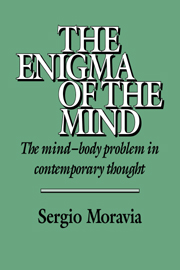Book contents
- Frontmatter
- Contents
- Preface to the English edition
- The enigma of the mind
- The enigma of the mind: Introduction to a metaphor
- 1 Toward a physical science of the mental: Feigl and the (re-)construction of the ‘mind–body problem’
- 2 The apogee of physicalism: The identity theory and materialism in the Australian school
- 3 The obscure relationship: Problems and debates surrounding the identity theory
- 4 Psychology as alchemy: The elimination of the mental in the ‘disappearance theory’
- 5 The mind as function: The functionalist approach to the mind–body problem
- 6 The mind as property and as event: The ‘reformist’ neo-identityism of Kim and Davidson
- 7 The mind as language: The linguistic turn in the mind–body problem
- 8 Speaking in many different ways: The pluralization of descriptions and explanations in the MBP
- 9 The mind as a mode of subjective experience: An interpretive model of the features of the mental
- 10 The mind as ‘subject’ and as ‘being-in-the-world’: Toward a non-mentalistic interpretation of the mental
- Appendix The mental as intentional/‘personal’ emergence: The psycho-personological perspective of Joseph Margolis
- Bibliography
- Name index
7 - The mind as language: The linguistic turn in the mind–body problem
Published online by Cambridge University Press: 05 June 2012
- Frontmatter
- Contents
- Preface to the English edition
- The enigma of the mind
- The enigma of the mind: Introduction to a metaphor
- 1 Toward a physical science of the mental: Feigl and the (re-)construction of the ‘mind–body problem’
- 2 The apogee of physicalism: The identity theory and materialism in the Australian school
- 3 The obscure relationship: Problems and debates surrounding the identity theory
- 4 Psychology as alchemy: The elimination of the mental in the ‘disappearance theory’
- 5 The mind as function: The functionalist approach to the mind–body problem
- 6 The mind as property and as event: The ‘reformist’ neo-identityism of Kim and Davidson
- 7 The mind as language: The linguistic turn in the mind–body problem
- 8 Speaking in many different ways: The pluralization of descriptions and explanations in the MBP
- 9 The mind as a mode of subjective experience: An interpretive model of the features of the mental
- 10 The mind as ‘subject’ and as ‘being-in-the-world’: Toward a non-mentalistic interpretation of the mental
- Appendix The mental as intentional/‘personal’ emergence: The psycho-personological perspective of Joseph Margolis
- Bibliography
- Name index
Summary
THE LINGUISTIC INTERPRETATION OF THE MENTAL AND ITS VARIANTS
In the preceding two chapters we pointed out the unquestionable merits as well as the limits of the proposals advanced by functionalism and by the other ‘reformist’ version of the identity theory. These proposals helped ‘liberalize’ the reflection on the mbp and orient it in new and stimulating directions. They have, however, been criticized by many philosophers of mind. The reservations expressed, more or less explicitly, about the positions of Putnam and Fodor and of Kim and Davidson can be summarized as follows:
a) There are frequent signs of more or less marked sympathy toward physicalism.
b) They show an excessive concern for the problems of the mind–body relationship as they are traditionally formulated. Although these problems have often received innovative answers the assumptions that underlie them have rarely been discussed adequately.
c) There seems to be a certain neglect of the problems regarding the mental in itself, that is, of the referents and contents to which it refers and of the particular approaches and explanations that it (perhaps) requires.
d) The figures of the physical and (most importantly) the mental have not been adequately thought through in linguistic terms.
In a sense, it may be said that it is this last point which most concerns a certain group of scholars who have occupied themselves with the philosophy of mind.
Information
- Type
- Chapter
- Information
- The Enigma of the MindThe Mind-Body Problem in Contemporary Thought, pp. 176 - 194Publisher: Cambridge University PressPrint publication year: 1995
